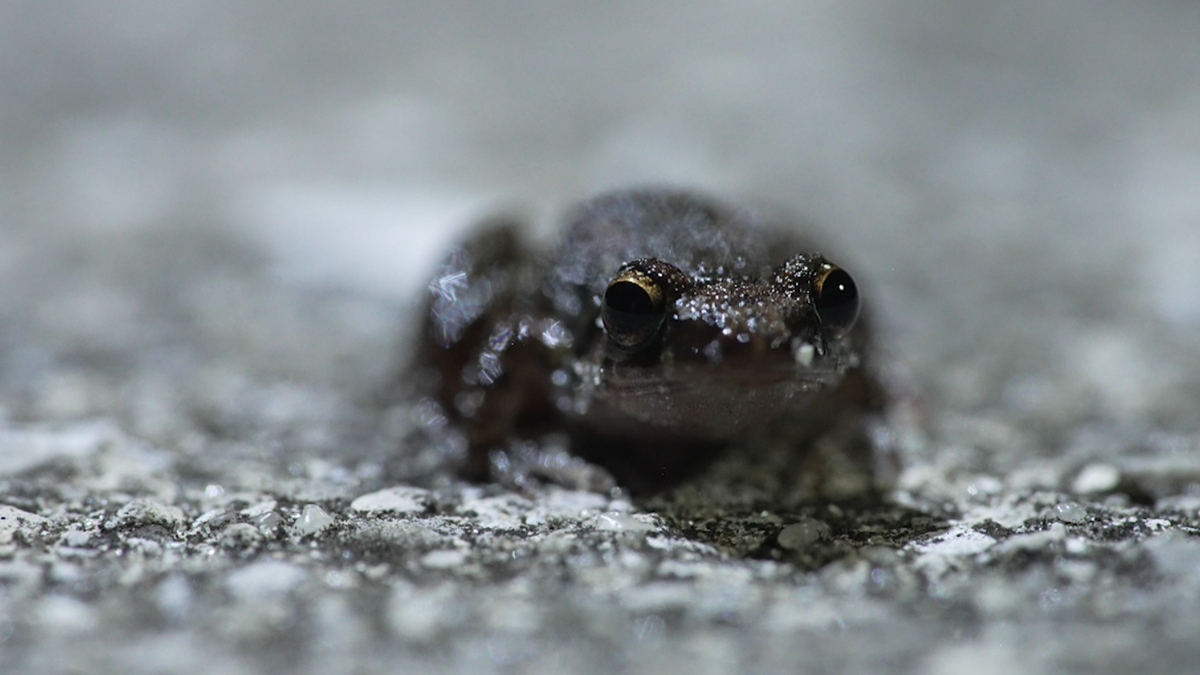When the sun sets on Florida Gulf Coast University in the summertime, it gets awfully quiet on campus. But for Win Everham and his group of students, that means it’s the perfect time to begin their work. Everham guides students on what’s known as “FrogWatch.” Truth is, it’s less about what they see – and more about what they hear. “It connects you to this landscape in a different way if you recognize — ‘Oh, that’s a Cuban Tree Frog. Oh, that’s a Cane Toad,’” Everham said. The group goes out once a month in the summer, stopping at about a dozen spots on or near campus. They listen carefully for three minutes at each site, recording what frogs they hear and the intensity of their calls. Recent FGCU graduate Celina Ceballos has become a FrogWatch regular. “It’s one of my favorite times of the year,” she said. “It’s great to just kind of see what’s out there. You never know what you’re going to find.” FrogWatch USA is a nationwide effort. This marks the 26th year of it happening in southwest Florida. Over that time, there’s been significant population growth on the Gulf Coast. That’s impacted what researchers hear out in the field. “You can clearly see, a place that was undeveloped that becomes developed, almost always you lose the frogs,” Everham said.But does that have to happen? Everham argues there’s a better way. After all, the sounds of the night can indicate more than just what frogs are in the area. They can help indicate the shape of the environment on the Gulf Coast. “If you build a development that has enough wetland to maintain a frog population, the other thing you have is enough wetland to absorb the heavy rainfall so your houses don’t flood. You’ve got enough wetlands to hold that water back, so it doesn’t get discharged downstream and cause harmful algal blooms on the coast,” Everham said. “Those things are connected. So, whether you like frogs or not, they’re a really nice way of looking at: are we good stewards of this landscape or not? And I think we can do better.” DOWNLOAD the free Gulf Coast News app for your latest news and alerts on breaking news, weather, sports, entertainment, and more.
When the sun sets on Florida Gulf Coast University in the summertime, it gets awfully quiet on campus.
But for Win Everham and his group of students, that means it’s the perfect time to begin their work.
Everham guides students on what’s known as “FrogWatch.” Truth is, it’s less about what they see – and more about what they hear.
“It connects you to this landscape in a different way if you recognize — ‘Oh, that’s a Cuban Tree Frog. Oh, that’s a Cane Toad,’” Everham said.
The group goes out once a month in the summer, stopping at about a dozen spots on or near campus.
They listen carefully for three minutes at each site, recording what frogs they hear and the intensity of their calls.
Recent FGCU graduate Celina Ceballos has become a FrogWatch regular.
“It’s one of my favorite times of the year,” she said. “It’s great to just kind of see what’s out there. You never know what you’re going to find.”
FrogWatch USA is a nationwide effort. This marks the 26th year of it happening in southwest Florida.
Over that time, there’s been significant population growth on the Gulf Coast. That’s impacted what researchers hear out in the field.
“You can clearly see, a place that was undeveloped that becomes developed, almost always you lose the frogs,” Everham said.
But does that have to happen? Everham argues there’s a better way.
After all, the sounds of the night can indicate more than just what frogs are in the area. They can help indicate the shape of the environment on the Gulf Coast.
“If you build a development that has enough wetland to maintain a frog population, the other thing you have is enough wetland to absorb the heavy rainfall so your houses don’t flood. You’ve got enough wetlands to hold that water back, so it doesn’t get discharged downstream and cause harmful algal blooms on the coast,” Everham said. “Those things are connected. So, whether you like frogs or not, they’re a really nice way of looking at: are we good stewards of this landscape or not? And I think we can do better.”
DOWNLOAD the free Gulf Coast News app for your latest news and alerts on breaking news, weather, sports, entertainment, and more.
